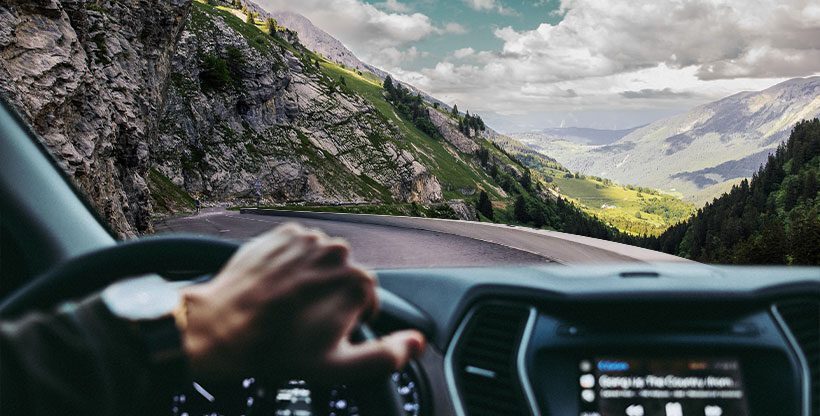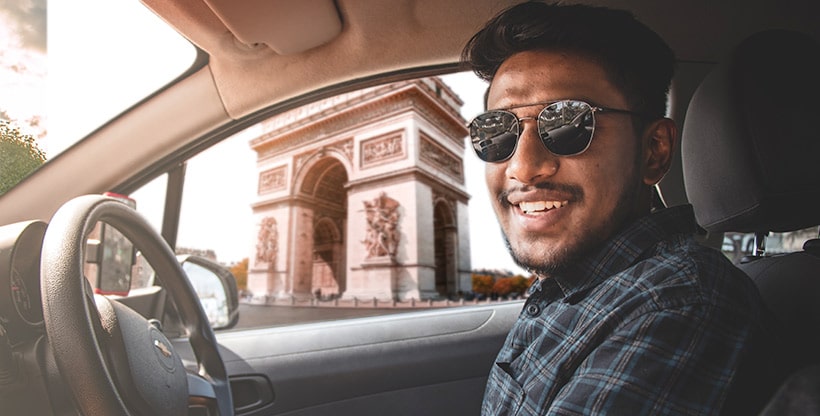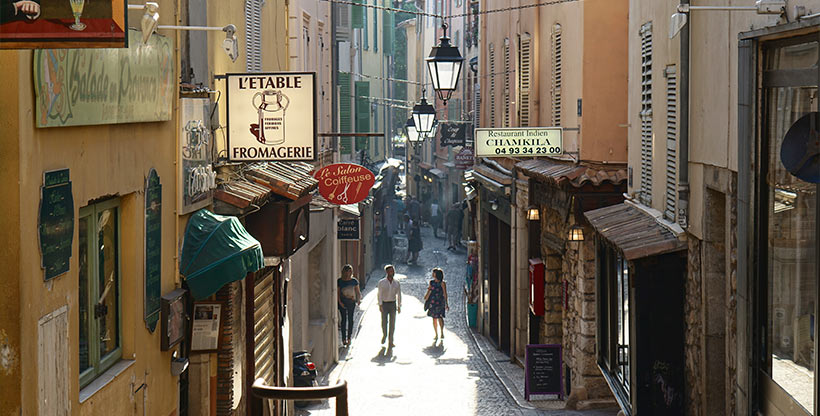Individuals
Tips for Driving in France: an Expat’s Guide

Driving in France is a great way to explore the country’s beautiful countryside and historic cities. If you’re an expat considering a relocation to France, it’s essential to understand French driving rules and etiquette to ensure a safe driving experience. While some driving similarities may exist with other countries, France has its unique set of rules and regulations that you need to be aware of.
By familiarizing yourself with the rules and tips below, you can feel confident and prepared to navigate the French roadways and embrace your new life as an expat in this beautiful country.
In This Guide:
Our comprehensive guide to driving in France as a foreigner, includes information on the following:
What Do You Need to Legally Drive in France?
Whether you plan on staying a week or a year, there are rules for remaining roadworthy in France. These rules not only help to maintain the safety of drivers, pedestrians, and passengers but also protect expats from fines and other penalties they may be unaware of. Here’s what you need:
License
France generally accepts driver’s licenses from other countries as long as the license is valid and in a language that the French authorities can read (Roman alphabet). If your license is not in French or English, you may need to obtain an official translation to be able to use it in France.
For expats who plan to reside in France for an extended period, you may need to obtain a French driver’s license. In general, it is recommended to obtain:
- an International Driving Permit (IDP)
- a translation of your license into multiple languages
This article provides information on how to obtain an IDP. Please note that these are general guidelines. It is always advised to check the latest information for your specific situation to ensure a smooth transition onto France’s roadways.
Car Insurance
If you’re operating a vehicle in France, you must have car insurance whether you are a tourist or resident or you may receive a fine.
The legal minimum is third-party liability which covers others for potential damage or injury you may cause. Rental car companies usually offer insurance, but if you will be in France for longer, it may be best to take out a longer-term policy.
It is highly recommended that your insurance extends beyond the legal limits, and get comprehensive coverage for France, which protects your vehicle from accidents, theft, and other incidents.
In France, car insurance covers the vehicle and not the driver. If you are unsure if your insurance meets France’s legal minimum or leaves you with any coverage gaps, it is a good idea to speak with an insurance professional to discuss your coverage options. Clements currently offers worldwide car insurance for physical damage and excess liability options. At this time we do not offer Third Party Liability insurance for France.

A Vehicle and License Plate
Renting a car is a good option in the short term, but for longer stays, you may want to import your car or buy one. For detailed instructions on rules for importing cars, visit French-Property.com. Non-citizens can buy, operate, and own a car in France, as long as they have a valid driver’s license that is recognized in France.
Note that in France, stick shift or manual vehicles are more popular, but some automatic ones are available. License plate numbers are assigned sequentially, therefore ruling out customization. Only two legal plate sizes exist—520 by 110 mm or 275 by 200 mm.
GPS Device
When driving in France, you may find it helpful to have a GPS with you, like your smartphone or GPS device. If you’re not using your phone, check the system for an updated French map.
Usually, French signs don’t have cardinal directions, so as you’re driving, they may tell you what city you’re traveling toward only, such as Paris or Nice.
While there might not be directions, the colors of the signs can tell you helpful information. For example, a white sign means you’re going toward small roads, as opposed to green signs, which indicate bigger roads. Blue signs are for highways.
Which Side of the Road Do I Drive On?
In France, you drive on the right-hand side and pass on the left-hand side. This driving arrangement can feel like second nature for a lot of expats. In fact, according to drivers’ education and defensive driving school Aceable,
there are only “76 countries and territories that follow left-hand traffic laws—or 34% of the world’s population.”
Additional standard road practices and manners exist, such as rules for passing other vehicles. As stated before, you typically pass on the left-hand side, but if traffic is in the left lane, you can overtake the car in the right lane if you have enough space to do so safely.
Additionally, if you’re driving downhill and a car is coming uphill, in France, the vehicle going up gets the right-of-way. The country permits only passing trams on the right side, but on one-way streets, you can pass on the left.
Another fundamental driving rule to remember is that when you’re at an intersection, you always give way to those on the right unless a sign exists. This rule also applies to roundabouts and giving way to that traffic before entering the circle.
Other common-sense regulations include pulling over for emergency vehicles with sirens sounding and lights flashing.
What Are the Different Rules When Driving in France?
While some driving rules in France may be similar to those in your home country, there are also some differences that can take you by surprise, so it’s crucial to familiarize yourself with the rules below to ensure a smooth and enjoyable driving experience.

The Driving Age in France
When it comes to driving in France, it’s important to note that the minimum driving age is 18 years old, according to information from the French Embassy in the U.S.
This age requirement differs from other countries like the U.S., where the minimum driving age is generally 16 years old, and some countries where it’s as high as 21 years old.
It’s worth noting that there are certain restrictions in place for new drivers in France. For example, drivers who have held their license for less than three years are subject to a lower alcohol limit of 0.2 g/L of blood, compared to the standard limit of 0.5 g/L for more experienced drivers.
It’s also important to keep in mind that driving laws and regulations can change, so it’s best to stay up to date with the latest information to ensure that you’re driving safely and legally on French roads.
Speed Limits
A few countries in the world don’t set a maximum speed limit for their roadways, like the Autobahn in Germany and the Northern Territory in Australia. If you’re coming from one of these locations, you will likely need to adjust to paying attention to the speed limit signs when driving on French roads.
Additionally, due to France using the metric system, the speeds are in kilometers and meters. While driving, you may only occasionally see signs indicating the speed. For example:
- When driving in Paris or other cities, the maximum speed is 50 kilometers per hour
- Outside the cities, it’s 80 kilometers per hour and 130 kilometers per hour on highways
For a comprehensive list of highway rules, consult the French Road Safety Observatory (ONISR) website.
Seatbelts
The driver and all passengers must have their seatbelts on while the car is in motion. It’s the driver’s responsibility to ensure that each person has buckled up before putting the car in drive. According to The Association of French Motorway Companies, or Association des Sociétés Françaises d’Autoroutes, French police officers can fine you up to 135 euros if they pull you over and someone isn’t wearing a seatbelt.
Traffic Lights
The traffic lights in France follow the traditional three-color system. In general, the flashing amber or yellow light cautions you to give way to the cars coming from the right, but you can go if it’s clear. When the red light is flashing, you’re not allowed to proceed. If there’s a red light with a yellow arrow, you can go in the arrow’s direction, but you must yield the right-of-way to pedestrians and the other vehicles coming from that direction.
Accidents, Roadside Assistance, and the French Police
If you’re in a car accident in France and you are able to, the law requires you to help injured people within the limits of your abilities without endangering yourself or others under the principle of “le devoir de porter secours,” or duty to provide assistance. Your obligation may involve calling emergency services (dialing 112 or 15 for medical emergencies) or administering first aid if you are qualified. Failing to help could result in a penalty, including fines and imprisonment, depending on the severity of the outcome.
Minor accidents can be handled between the involved parties; however, you should call the police in the following situations:
- Injuries or fatalities
- Significant property damage
- Uncooperative motorists (refusing to exchange information)
- If you suspect the influence of drugs and/or alcohol
- The other party is unlicensed or uninsured
- The accident involves government vehicles, a pedestrian, or a cyclist
Often, police will gather information, so it is a good idea to ask permission to leave the scene after an accident. You can dial 17 to reach the police or 112 on an international phone. While on the roadside, wear a reflective safety vest and use a warning triangle to inform other drivers of the accident. All French vehicles must carry these items at all times.
The police will give you an accident form to complete. Law enforcement officials don’t require you to complete it, but if you’re filing an insurance claim, you must complete it.
If you need road assistance during an accident or have car troubles, you can’t have your own roadside assistance company help you because French roads are under private management. If you experience car trouble, you can use the orange emergency telephones on the side of the main roads and motorways. Call the police on your phone if the emergency telephones aren’t nearby.
Parking Rules
For parking in France, you’re only allowed to stop and park on the right-hand side when there are two lanes of traffic. If you’re on a one-way street, you can stop and park on either side if there’s enough space.
Pay attention to yellow curb paint because if there’s a continuous yellow line, you can’t park there, but if you see a broken yellow line, you can park there. Look for signs indicating areas of paid parking and pay the fee. Your car can get towed or wheel-clamped for parking violations.
For people with disabilities driving in Paris, you can park for free in paid lots. Dedicated signs for disability parking exist, but the driver must display a badge in a visible spot in the vehicle. Drivers with disabilities also get unlimited parking time in timed and paid lots.

Highway Tolls in France
Tolls are quite prevalent in France, and you can pay by cash or credit card in a lane with a green arrow. Be advised that most major credit cards are accepted, but that can vary by toll both. So, be sure to carry a little cash to cover your toll just in case. To use the highway toll machines, select the instructions in English, follow the directions, and insert your currency.
Car Horns
Drivers rarely use their car horns in France. Usually, people only beep them to give other drivers a warning. You’re not allowed to use the car horn between sunset and sunrise. You can only flash your lights to warn other drivers during this time.
Drive With Confidence in France
Driving in France can be a wonderful experience for expats who love a good road trip, but your enjoyment only goes so far as your safety. The tips covered in this guide can help you educate yourself on local roadways and be aware of the French driving rules and etiquette. To have a safe and enjoyable journey, ensure you have good insurance coverage in place to stay legally compliant.
Clements offers worldwide car insurance coverage in over 170 countries. We count your no-claims time in other countries, potentially saving you money. For expats in France we can provide Physical Damage protection, however we are currently not able to offer Third Party Liability insurance. Contact us with any questions you may have about coverage. Our goal is to ensure you make the most of your expat life abroad while staying protected in accordance with the local requirements in your country of residence within your budget.
Related Helpful Content
Find tips, trends, and perspectives to help you confidently make decisions and navigate challenges internationally with peace of mind. Read how you can live, operate, and manage risks abroad.
An Expat’s One-Stop Guide to Driving in Ireland
Steering Through Spuds and Sheep: Tips for Driving, Requirements, Traffic Rules,
Tips for Driving in France: an Expat’s Guide
Driving in France is a great way to explore the country’s
12 Best Scenic Drives & Road Trips in the UK & Ireland
For expats in the United Kingdom or business travelers who wind